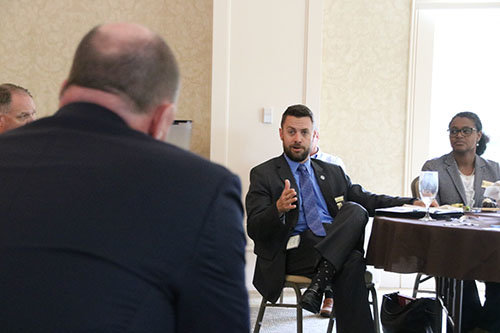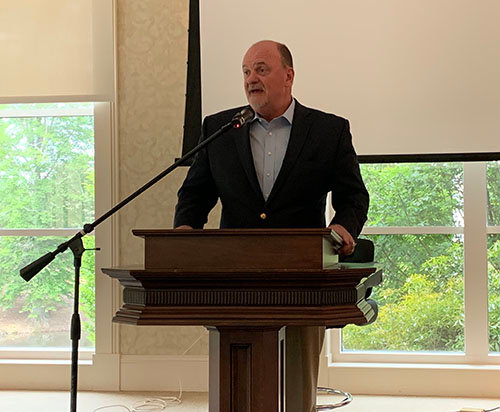
DULUTH — On its surface the luncheon held at the Missions and Ministry Center here Wednesday, May 1 wouldn’t appear to be all that different from others.
An outside group, in this instance various law enforcement personnel, arrives for a moment of appreciation from Georgia Baptists. Lunch is served and fellowship enjoyed. A short program highlights the importance of the guests with some more words of appreciation.
This gathering took an added step, though. The appreciation in food and welcome were present. But it also included the presentation of a resource in the ongoing battle against human trafficking. A 45-minute discussion led by Executive Director W. Thomas Hammond, Jr. followed on how Georgia Baptists can better partner with law enforcement in fighting human trafficking.
It marked a slight, though significant, change in how Hammond wants Georgia Baptists to view Mission Georgia, the rallying cry for reaching the state for Christ. Evangelism and salvation through Jesus remain the focus of Mission Georgia, Hammond told The Index. However, it will also become more apparent that reaching the state will include more active partnership such as the one on display Wednesday.
“The Gospel should touch every part of our life, and therefore with so many Georgia Baptists it should touch every part of our state,” he said. “Partnering with law enforcement against human trafficking is just one example of ways we’re looking at Mission Georgia as a call to truly transform our state.”
While no concrete plans are in place, Hammond hinted at future outreach such as leading Georgia churches to provide pre-natal care to expectant mothers and funding to encourage Georgia Baptists to become part of the foster care and adoption system.
Critics of the recently passed heartbeat bill have said it would result in more children in Georgia needing more services. Hammond said that should those predictions become true, Georgia Baptists need to be ready to help.
“What are some things we can be proactive for that? For those moms who want to keep their babies, how can we help them? A lot of those ladies don’t have health care and access to pre- and post-natal care. There are many other things like that we want to be involved in, because they’re part of our mission field – Georgia.”
Georgia Baptist churches should be recognized as places where Christ is taught. But he explained to the officials present, they should also be seen as resources.
“You many not think right now ‘Where is the nearest Baptist church?’ when helping a victim of human trafficking,” he said to the law enforcement officials. “My prayer is that you soon will, because we want to become part of an army working to help Georgia become a state much healthier than it is now.”
Alpharetta First Baptist Church, where Hammond served previously, over time developed an active relationship with leadership in the Alpharetta Police Department.
“Our church wanted to be a resource to encourage the police and fire department and their families. The Lord gave us that opportunity to do that,” he said.
What are some challenges, Hammond asked law enforcement, that churches could help meet?
Gainesville Chief of Police Jay Parrish responded that trafficking victims trying to get out will often need a place to stay on short notice.

“It can be as simple as a church couple having a spare bedroom,” he said. “I’m talking 24 or 48 hours, until a case worker can be assigned.”
That kicked off a conversation with ideas pinballing around the room and input only available from those involved day-to-day.
Prior to that, guests were connected via online conferencing with Jeremy Mahugh, co-founder and senior vice president for an organization devoted to fighting human trafficking. For about 35 minutes Mahugh described the background of his organization and its potential as a resource for law enforcement personnel.
His organization, Mahugh explained, was made up of uniquely trained individuals with backgrounds in Special Forces, FBI, Delta Force, and the Navy SEALS to combat human trafficking. He outlined the benefits and training available to agencies should they want to partner with the resource, as well as costs associated. The officers, all active in rescuing trafficking victims and prosecuting the perpetrators, listened and asked questions.
Hammond’s discussion with law enforcement largely took on the tone of the recent Listening Sessions held with pastors. Open-ended questions from the executive director asked for feedback from those in the field.
In addition to providing a short-term place to stay, any opportunity for learning job skills would increase victims’ ability to leave the sex industry for good. Should the Mission Board consider building homes for trafficking victims, churches could sponsor those homes for maintenance. Georgia Baptists could also contribute to the growing need for tattoo removal or cover-up, as that is how many victims are “marked” by their pimps and madams.
Trafficking is far from a “big city,” problem, guests emphasized. Jail ministries in small towns across the state could impact numerous lives for women unused to being heard and cared for. “It would ‘kick in the door’ to help them talk about their situation when we can’t,” said one officer in attendance.
The discussion further confirmed the breakdown of the family as a heavily-contributing factor to human trafficking’s growth. The guests advised training for Georgia Baptists in not only how to spot signs of trafficking, but what to do if a victim approaches you trying to escape.
Hammond communicated thanks for their feedback and promise to continue Georgia Baptist involvement.
“This is step 1,” he said. “We’re praying for God to show us our role in all of this and how to be of help. We call on Georgia Baptists to join us in praying for wisdom as we forge partnerships that address this issue and enable us to see lives changed with the Gospel of Jesus Christ.”